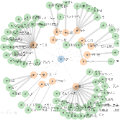Utilities of knowledge graphs (KGs) depend on their qualities. A KG that is of poor quality not only has little applicability but also leads to some unexpected errors. Therefore, quality evaluation for KGs is crucial and indispensable. Existing methods design many quality dimensions and calculate metrics in the corresponding dimensions based on details (i.e., raw data and graph structures) of KGs for evaluation. However, there are two major issues. On one hand, they consider the details as public information, which exposes the raw data and graph structures. These details are strictly confidential because they involve commercial privacy or others in practice. On the other hand, the existing methods focus on how much knowledge KGs have rather than KGs' practicability. To address the above problems, we propose a knowledge graph quality evaluation framework under incomplete information (QEII). The quality evaluation problem is transformed into an adversarial game, and the relative quality is evaluated according to the winner and loser. Participants of the game are KGs, and the adversarial gameplay is to question and answer (Q&A). In the QEII, we generate and train a question model and an answer model for each KG. The question model of a KG first asks a certain number of questions to the other KG. Then it evaluates the answers returned by the answer model of the other KG and outputs a percentage score. The relative quality is evaluated by the scores, which measures the ability to apply knowledge. Q&A messages are the only information that KGs exchange, without exposing any raw data and graph structure. Experimental results on two pairs of KGs demonstrate that, comparing with baselines, the QEII realizes a reasonable quality evaluation from the perspective of third-party evaluators under incomplete information.
翻译:知识图形( KGs) 的公用工具( 原始数据和图形结构) 取决于它们的品质。 一个质量差的 KG, 不仅没有多少适用性, 而且还会导致一些出人意料的错误。 因此, KGs 的质量评估至关重要, 不可或缺。 现有方法根据 KGs 的详细内容( 原始数据和图形结构) 设计许多质量层面, 并计算相应层面的衡量尺度。 但是, 有两个主要问题。 一方面, 他们认为细节是公开原始数据和图形结构的公共信息。 这些细节是严格保密的, 因为它们涉及商业隐私或其他实践。 另一方面, 现有的方法侧重于 KGs 的知识交换程度, 而不是 KGs 的实用性。 为了解决上述问题, 我们在不完整的信息( QEII) 下提出了一个知识图表质量评估框架。 质量问题被转化成一个对抗性游戏, 相对质量根据赢家和输家来评估。 游戏的参与者是 KG, 对抗性游戏的数值是问答 ( QA)。 在 QEII 中, 我们生成和训练一个对KG 质量的相对质量结构的答案, 一个模型, 然后将一个对KG 的答案进行一个比较一个模型, 。





